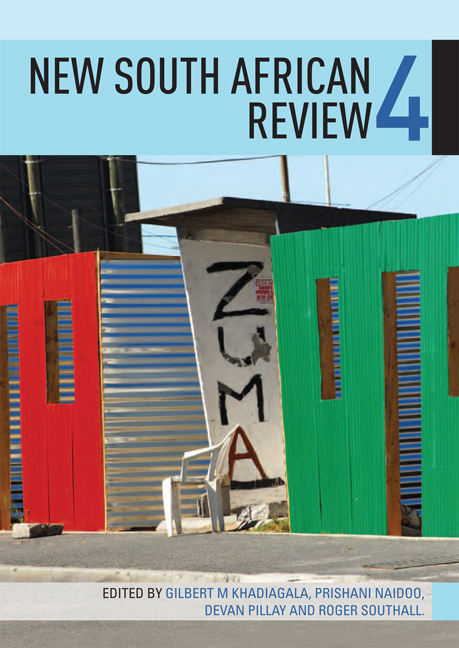Book contents
- Frontmatter
- Contents
- Preface
- Introduction: South Africa's fragile democracy: Twenty years on
- PART ONE ECOLOGY, ECONOMY AND LABOUR
- Introduction
- Chapter 1 The South African labour market after eighteen years: It's class struggle, stupid!
- Chapter 2 The state of organised labour: Still living like there's no tomorrow
- Chapter 3 Citizen Wal-Mart? South African food retailing and selling development
- Chapter 4 Transcending South Africa's oil depen
- Chapter 5 The politics of electricity generation in South Africa
- PART TWO POWER, POLITICS AND PARTICIPATION
- PART THREE PUBLIC POLICY AND SOCIAL PRACTICE
- PART FOUR SOUTH AFRICA AT LARGE
- Contributors
- Index
Chapter 2 - The state of organised labour: Still living like there's no tomorrow
from PART ONE - ECOLOGY, ECONOMY AND LABOUR
Published online by Cambridge University Press: 21 April 2018
- Frontmatter
- Contents
- Preface
- Introduction: South Africa's fragile democracy: Twenty years on
- PART ONE ECOLOGY, ECONOMY AND LABOUR
- Introduction
- Chapter 1 The South African labour market after eighteen years: It's class struggle, stupid!
- Chapter 2 The state of organised labour: Still living like there's no tomorrow
- Chapter 3 Citizen Wal-Mart? South African food retailing and selling development
- Chapter 4 Transcending South Africa's oil depen
- Chapter 5 The politics of electricity generation in South Africa
- PART TWO POWER, POLITICS AND PARTICIPATION
- PART THREE PUBLIC POLICY AND SOCIAL PRACTICE
- PART FOUR SOUTH AFRICA AT LARGE
- Contributors
- Index
Summary
INTRODUCTION
One of the features of the past few years has been the extent to which the role of trade unionism and collective bargaining in South Africa have been called into question. Some commentators have gone as far as referring to an ‘opportunity to smash the unions and enhance the economy's long-term job-creation potential’ (Sharp 2012). Others acknowledge the importance of organised labour in South Africa's industrial landscape, ‘but not in its current form’ (Business Day 5 July 2012). By the end of 2012, and with some normality having returned in the wake of the tragedy at Marikana on 16 August when thirty-four mineworkers were killed by members of the South African Police Services, and an uneasy truce having returned in the farming sector of the Western Cape after violent protest actions, it was clear that something of a turning point had been reached.
The general assumption is that there has been a significant weakening of trade unionism, most clearly pronounced in relation to the shifting allegiance in the platinum mining sector from the National Union of Mineworkers (NUM) to the Association of Mineworkers and Construction Union (Amcu). Parallel to the weakening thesis sits a thesis of political power exercised by the Congress of South African Trade Unions (Cosatu) over the African National Congress (ANC) and government in how to regulate labour and the labour market. This has been most commonly argued in relation to Cosatu's opposition to labour brokers and the youth wage subsidy – both complex policy issues whose implementation was stalled for some time due to political difficulties. A similar argument has emerged in relation to the extension of the collective agreement between employers and trade unions in the clothing sector and its impact on jobs in the Newcastle area of KwaZulu-Natal.
What then is the reality of trade unionism in South Africa in the wake of Marikana? A divided and weakened union movement, or one that continues to command substantial power and is able to exercise significant political influence? And what are some of the challenges for trade unionism and for policy in the wake of the events of 2012?
- Type
- Chapter
- Information
- New South African Review , pp. 39 - 55Publisher: Wits University PressPrint publication year: 2014

